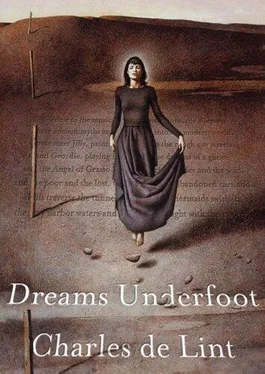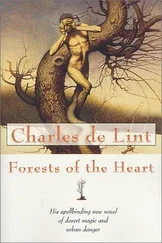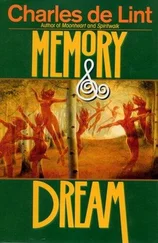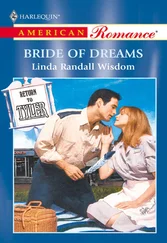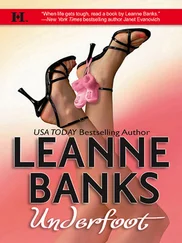The rain started as a thin drizzle as were making our way through Crowsea’s narrow streets. Sam’s fingers tightened on my arm and Jilly stopped fooling around as we stepped into Henratty Lane, the rain coming down in earnest now. The ghost was just turning in the far end of the lane.
“Geordie,” Sam said, her fingers tightening more.
I nodded. We brushed by Jilly and stepped up our pace, aiming to connect with the ghost before he made his turn and started back towards Stanton Street.
“This is not a good idea,” Jilly warned us, hurrying to catch up. But by then it was too late.
We were right in front of the ghost. I could tell he didn’t see Sam or me and I wanted to get out of his way before he walked right through us—I didn’t relish the thought of having a ghost or a timeskip or whatever he was going through me. But Sam wouldn’t move. She put out her hand, and as her fingers brushed the wet tweed of his jacket, everything changed.
The sense of vertigo was strong. Henratty Lane blurred. I had the feeling of time flipping by like the pages of a calendar in an old movie, except each page was a year, not a day. The sounds of the city around us—sounds we weren’t normally aware of—were noticeable by their sudden absence. The ghost jumped at Sam’s touch. There was a bewildered look in his eyes and he backed away. That sensation of vertigo and blurring returned until Sam caught him by the arm and everything settled down again. Quiet, except for the rain and a faroff voice that seemed to be calling my name.
“Don’t be frightened,” Sam said, keeping her grip on the ghost’s arm. “We want to help you.”
“You should not be here,” he replied. His voice was stiff and a little formal. “You were only a dream—nothing more. Dreams are to be savoured and remembered, not walking the streets.”
Underlying their voices I could still hear the faint sound of my own name being called. I tried to ignore it, concentrating on the ghost and our surroundings. The lane was clearer than I remembered it—no trash littered against the walls, no graffiti scrawled across the bricks. It seemed darker, too. It was almost possible to believe that we’d been pulled back into the past by the touch of the ghost.
I started to get nervous then, remembering what Jilly had told us. Into the past. What if we were in the past and we couldn’t get out again? What if we got trapped in the same timeskip as the ghost and were doomed to follow his routine each time it rained?
Sam and the ghost were still talking but I could hardly hear what they were saying. I was thinking of Jilly. We’d brushed by her to reach the ghost, but she’d been right behind us. Yet when I looked back, there was no one there. I remembered that sound of my name, calling faintly across some great distance.
I listened now, but heard only a vague unrecognizable sound. It took me long moments to realize that it was a dog barking.
I turned to Sam, tried to concentrate on what she was saying to the ghost. She was starting to pull away from him, but now it was his hand that held her arm. As I reached forward to pull her loose, the barking suddenly grew in volume—not one dog’s voice, but those of hundreds, echoing across the years that separated us from our own time. Each year caught and sent on its own dog’s voice, the sound building into a cacophonous chorus of yelps and barks and howls.
The ghost gave Sam’s arm a sharp tug and I lost my grip on her, stumbling as the vertigo hit me again. I fell through the sound of all those barking dogs, through the blurring years, until I dropped to my knees on the wet cobblestones, my hands reaching for Sam. But Sam wasn’t there.
“Geordie?”
It was Jilly, kneeling by my side, hand on my shoulder. She took my chin and turned my face to hers, but I pulled free.
“Sam!” I cried.
A gust of wind drove rain into my face, blinding me, but not before I saw that the lane was truly empty except for Jilly and me. Jilly, who’d mimicked the barking of dogs to draw us back through time.
But only I’d returned. Sam and the ghost were both gone.
“Oh, Geordie,” Jilly murmured as she held me close. “I’m so sorry.
* * *
I don’t know if the ghost was ever seen again, but I saw Sam one more time after that night. I was with Jilly in Moore’s Antiques in Lower Crowsea, flipping through a stack of old sepiatoned photographs, when a group shot of a family on their front porch stopped me cold. There, among the somber faces, was Sam. She looked different. Her hair was drawn back in a tight bun and she wore a plain unbecoming dark dress, but it was Sam all right. I turned the photograph over and read the photographer’s date on the back. 1912.
Something of what I was feeling must have shown on my face, for Jilly came over from a basket of old earrings that she was looking through.
“What’s the matter, Geordie, me lad?” she asked.
Then she saw the photograph in my hand. She had no trouble recognizing Sam either. I didn’t have any money that day, but Jilly bought the picture and gave it to me. I keep it in my fiddle case.
I grow older each year, building up a lifetime of memories, only I’ve no Sam to share them with. But often when it rains, I go down to Stanton Street and stand under the streetlight in front of the old Hamill estate. One day I know she’ll be waiting there for me.
There is apparently nothing that cannot happen.
— Attributed to Mark Twain
There are three kinds of people: those who make things happen, those who watch things happen, and those who wonder, “what happened?”
— Message found inside a Christmas cracker
1
He stood on the rainslick street, a pale fire burning behind his eyes. Nerve ends tingling, he watched them go—a slow parade of riderless bicycles.
Tenspeeds and mountain bikes. Domesticated, urban. So inbred that all they were was spoked wheels and emaciated frames, mere skeletons of what their genetic ancestors had been. They had never known freedom, never known joy; only the weight of serious riders in slick, leatherseated shorts, pedaling determinedly with their cycling shoes strapped to the pedals, heads encased in crash helmets, fingerless gloves on the hands gripping the handles tightly.
He smiled and watched them go. Down the wet street, wheels throwing up arcs of fine spray, metal frames glistening in the streetlights, reflector lights winking red.
The rain had plastered his hair slick against his head, his clothes were sodden, but he paid no attention to personal discomfort. He thought instead of that fatwheeled aboriginal onespeed that led them now. The maverick who’d come from who knows where to pilot his domesticated brothers and sisters away.
For a night’s freedom. Perhaps for always.
The last of them were rounding the corner now. He lifted his right hand to wave goodbye. His left hand hung down by his leg, still holding the heavyduty wire cutters by one handle, the black rubber grip making a ribbed pattern on the palm of his hand. By fences and on porches, up and down the street, locks had been cut, chains lay discarded, bicycles ran free.
He heard a siren approaching. Lifting his head, he licked the rain drops from his lips. Water got in his eyes, gathering in their corners. He squinted, enamored by the kaleidoscoping spray of lights this caused to appear behind his eyelids. There were omens in lights, he knew. And in the night sky, with its scattershot sweep of stars. So many lights ... There were secrets waiting to unfold there, mysteries that required a voice to be freed.
Like the bicycles were freed by their maverick brother. He could be that voice, if he only knew what to sing.
Читать дальше
